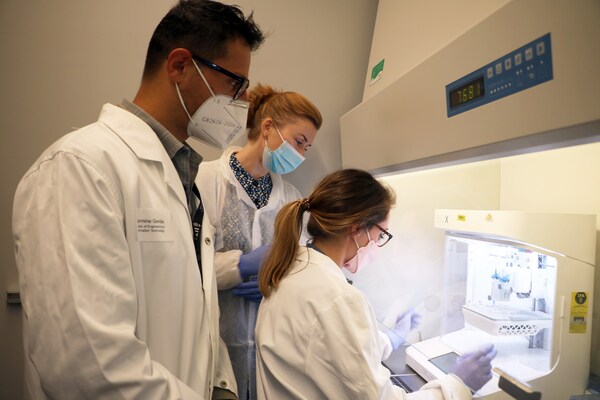University of Technology Sydney researchers develop ground-breaking heart failure treatment using 3D-printed heart tissue
- Written by PR Newswire Asia - Daily Bulletin Au RSS
New technology enables 'patches' of 3D printed tissue to be applied onto the surface of damaged hearts as a safer and more cost-effective alternative to heart transplants.
SYDNEY, April 20, 2023 /PRNewswire/ -- Researchers from The University of Technology Sydney (UTS) have demonstrated that 3D bioprinted heart tissues can safely and effectively help patients recover from damage caused by an extensive heart attack.
The tissues are created from cells that are isolated from the blood of the patient. The team can then 3D model the patient's heart and identify the damaged area, before applying the new 'patch' on the surface of the heart.
"Our study demonstrated that bio-engineered patches were the best and most robust treatment of heart failure," said Dr Carmine Gentile, head of the Cardiovascular Regeneration Group at UTS.
 Dr Carmine Gentile, Dr Irina Kabakova, and Laura Vettori in the Advanced Biofabrication Facility at UTS.
Dr Carmine Gentile, Dr Irina Kabakova, and Laura Vettori in the Advanced Biofabrication Facility at UTS.
"Our bio-engineered patches promise to be safer, more consistent and cost-effective for the patient."
The findings have been published in the world-leading academic journal, Bioprinting.
Heart failure is a complication of heart disease, with inadequate blood supply resulting in the death of heart tissue in an affected area. Current interventions include heart transplants—an invasive procedure with significant risks.
"Because this technology will enable patients to use their own stem cells to create the heart 'patches', not only can they potentially dramatically reduce the trauma and cost of a heart transplant, but also avoid hurdles such as a body rejecting donor tissues," said Dr Gentile.
Heart Research Australia, a key funding partner of the research, commended the advances made by Dr Gentile and his research team in striving to improve the devastating statistics surrounding heart disease.
"It's wonderful to hear that this research partnership has proven to be successful and is now able to progress to the next stage. We are excited about the potential of this technology to help the hundreds of thousands of people affected by heart failure each year," said Nicci Dent, CEO Heart Research Australia.
Further testing for long term effects of this technology are underway before researchers begin clinical trials.
The University of Technology Sydney (UTS) is among the top 150 universities in the world, known for driving positive impact across the world through a range of global research partnerships. UTS ranks #1 in research impact in Australia.
To learn more, visit uts.edu.au.
Authors: PR Newswire Asia - Daily Bulletin Au RSS
Read more https://www.prnasia.com/story/archive/4069109_AE69109_0




